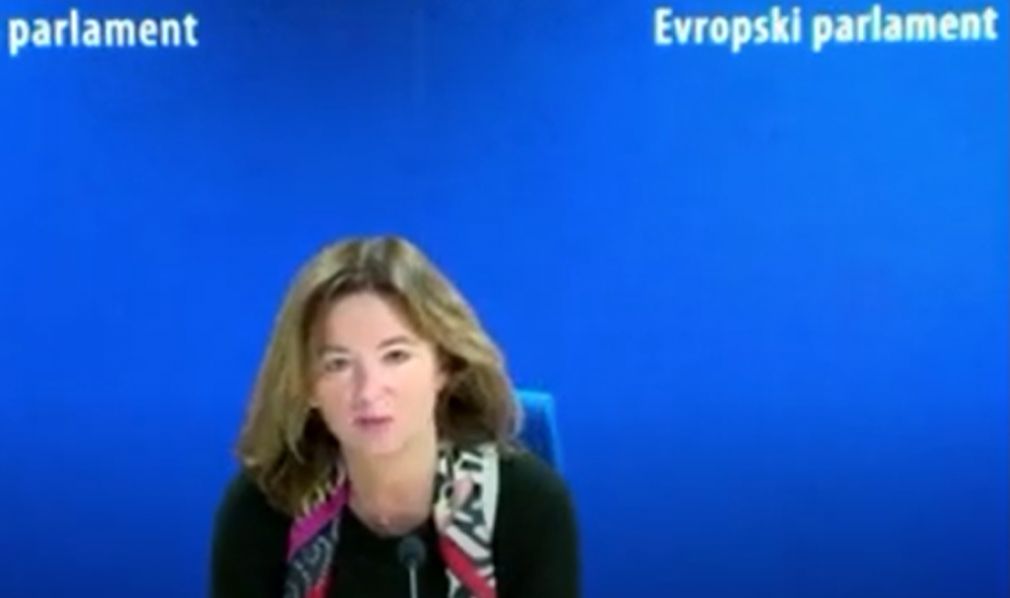By Sara Rančigaj
The coronavirus pandemic has left its impact on democracy, the rule of law and fundamental rights in all Member States. In her speech to the plenary session, the President of the Social Democrats pointed out that the influence in some countries is turning into a lasting, difficult to erase seal. She accused various governments across the EU of taking measures under the pretext of saving people’s lives, while diminishing the reputation of Slovenia and Hungary in the EU. “Consultation and cooperation with the health profession, civil society and the political opposition is crucial. Only with joint efforts will we succeed, the sooner we will be aware, the sooner we will overcome this crisis,” says Fajon in the EU, while she is not able to cooperate on home soil. It is also critical of limiting protests, proving once again its political responsibility to spread infections.
The plenary session of the European Parliament on the European Parliament Resolution on the impact of measures against covid-19 on democracy, the rule of law and fundamental rights took place in Brussels today, where MEP and SD President Tanja Fajon also spoke. Her discussion was all the more interesting because, in line with her agenda, she re-used the topic to attack the Slovenian government and the governments of other countries, which had to take more or less severe restrictive measures to prevent covid-19 infections spread.
Fajon stressed that some agree on the government’s measures, but stressed that governments are using the pandemic as an excuse to change the balance of power more permanently. The draft resolution, which was prepared at the EU level, is described as a dangerous challenge to the basic systems of the state. “From restricting freedom of movement, expression and information, freedom of religion, the right to family life, education and work,” she deftly misled. The resolution calls on the Member States to take into account the recommendations of international bodies such as the UN and the Council of Europe when adopting, assessing or reviewing measures that may limit the functioning of democratic institutions, the rule of law or fundamental rights, while respecting EU fundamental rights and the rule of law.
Slovenia and Hungary were the most slandered
While almost all governments across European Union have taken restrictive measures in the second wave to reduce the effects of the pandemic and the death toll, countries such as France, Italy, Spain and Austria, for example, have been accused of doing so out of different interests. “All this and more has been accepted by the governments of the union under the pretext of saving people’s lives,” she said, pointing to governments that have taken restrictive measures to mitigate the effects of the coronavirus pandemic.
In all of this, she highlights Hungary and Slovenia the most, which were success stories during the first wave and overcame the crisis with a minor number of deaths. “How many lives has Hungary saved when the Hungarian president has been given the power to rule by decree completely out of parliament during a state of emergency,” she said of Hungary. She claims similarly for Slovenia, emphasizing the activities of non-governmental organizations. It is also concerned about the adoption of a law on the presence of the army at the border, but according to the European Parliament, organized crime and other serious crime have benefited from the pandemic, and they want to increase Europol’s role in monitoring the impact of the covida-19 pandemic on serious crime and organized crime and terrorism in the EU since the beginning of the pandemic.
Fajon believes that protests should be allowed, regardless of the full number of hospitals. She also points out the new punishments planned for the protesters, while there is an epidemic in Slovenia. For more than twenty weeks, protesters have been protesting in Ljubljana, which has actually started with her help. Finally, the protests turned into sharp attacks on the police. For the second day in a row, 40 people died of coronavirus in Slovenia, but Fajon still describes the government’s decisions as completely absurd and, in her opinion, they have nothing to do with the fight against the virus and saving lives.
Friday’s protests have been banned in the past, but have been stoically monitored by police. This time, however, with the deteriorating epidemiological picture and violent riots, they had to take action and increased the penalties for organizing protests due to the situation. The motion for a resolution thus states that it calls on EU members to restrict freedom of association only if this is necessary and justified by local epidemiological conditions and is proportionate, and not to prohibit demonstrations in order to take controversial measures that deserve adequate public and democratic debate, even if these measures are not related to covid-19.
It called on the Member States to work exclusively for the benefit of the people and to take measures that are necessary, proportionate and temporary. “Consultation and cooperation with the health profession, civil society and the political opposition is crucial. Only with joint efforts will we succeed, the sooner we will be aware, the sooner we will overcome this crisis,” says Fajon. According to her actions, she does not want to cooperate with the coalition, despite the fact that she strongly emphasizes cooperation in the EU. The resolution calls on the Member States to involve independent experts on democracy, the rule of law and fundamental rights in decision-making, as appropriate, and to take into account the expertise of many experts and stakeholders, including national human rights institutions, ombudsman institutions and civil society, and proactively consult with them.

